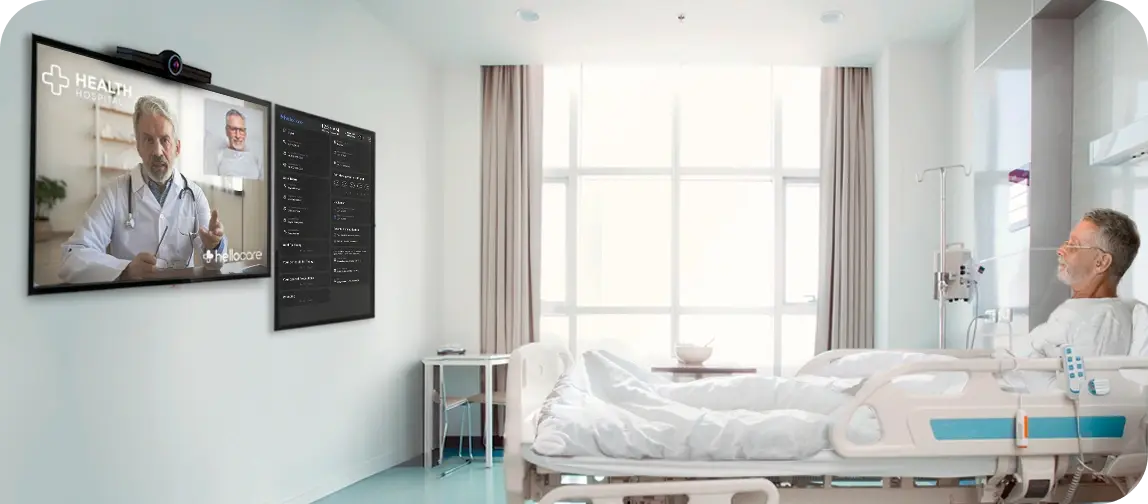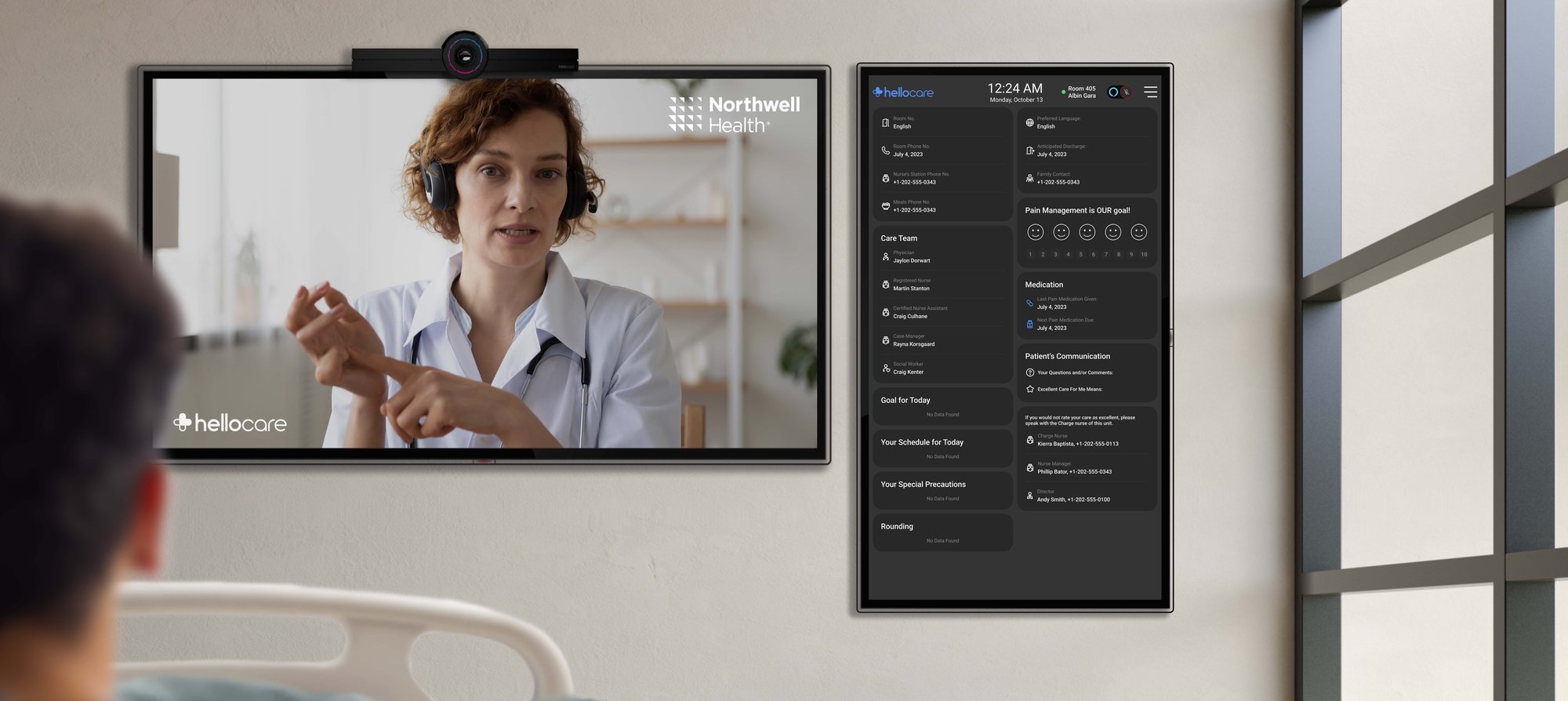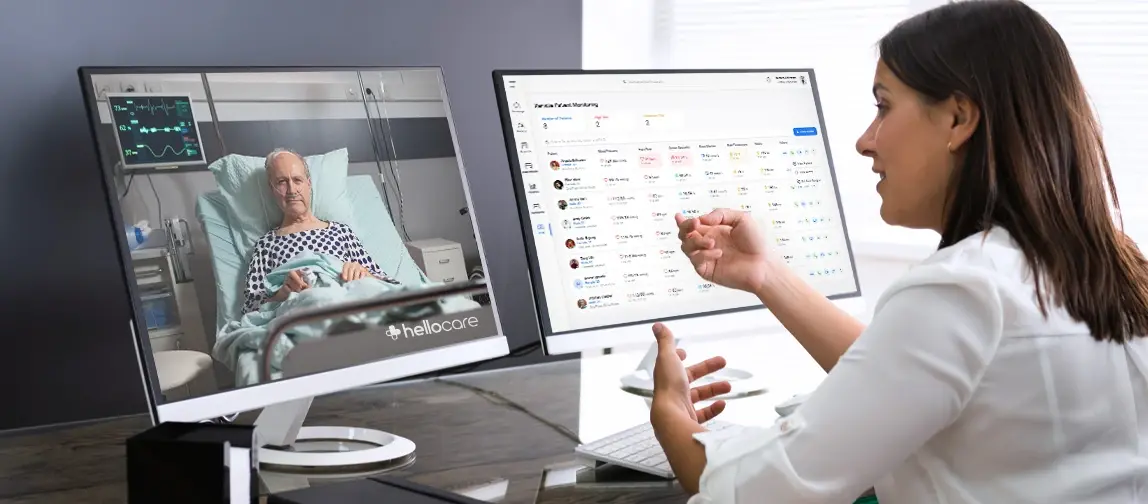Redefining Healthcare
How Virtual Care Delivery Addresses Staff Shortages
May, 2024 2:18:39 PM

Healthcare systems worldwide are facing critical staff shortages, particularly among nurses. Predictions indicate
a deficit of 1.2 million nurses in the United States by 2030. In response, technology, especially virtual care
platforms like hellocare, is emerging as a vital solution to this escalating crisis. With its advanced AI capabilities,
hellocare is designed to enhance human expertise with intelligent automation, thereby alleviating some of
the pressures caused by these shortages.
The telemedicine market, encompassing services like virtual nursing, virtual rounding, and virtual sitting,
has seen a substantial growth trajectory, with its valuation expected to nearly quadruple by 2030. This rapid
expansion is reshaping healthcare by altering traditional metrics such as the nurse-to-patient ratio. By
improving this ratio from 1:5 to 1:6, virtual care platforms enable healthcare facilities to manage an increased
patient load effectively without compromising the quality of care delivered.
The implementation of virtual care tools allows nurses to monitor and interact with patients remotely, reducing the time spent on in-person visits and thus increasing the capacity for patient oversight. This technology also facilitates a more flexible approach to patient management, where healthcare providers can quickly respond to changes in a patient's condition, prioritize care based on real-time data, and allocate resources more dynamically. Virtual care platforms incorporate advanced data analytics to track health trends and predict needs, which optimizes nurse schedules and patient care plans, making the overall healthcare delivery system more efficient.
Nurse burnout is a significant issue, with many nurses leaving the profession due to the physical and emotional demands of the job.
Virtual care offers a sustainable solution by providing seasoned nurses the opportunity to continue their practice in a less
physically demanding environment. This transition enables experienced nurses to focus on tasks such as patient consultation,
care coordination, and mentorship, all from a remote setting. This not only extends the careers of veteran nurses but also helps
in retaining their invaluable expertise within the healthcare system.
Moreover, by shifting more experienced nurses to virtual roles, healthcare facilities can create more on-the-ground opportunities for junior nurses. This leads to a beneficial cycle of career progression where junior nurses gain valuable experience and mentorship under the guidance of seasoned professionals. This model fosters a robust knowledge transfer within organizations, promoting a culture of learning and professional growth that helps keep nurses engaged and committed to their roles.
Virtual care platforms like hellocare play a crucial role in mitigating nurse burnout by significantly reducing
the need for overtime. The streamlined processes enabled by virtual care ensure that nurses can provide care without
the extended hours that traditionally lead to exhaustion and stress. This reduction in overtime is not just about cutting
hours; it's about enhancing work-life balance and allowing nurses to deliver care under less pressure.
Furthermore, these platforms enhance job satisfaction by providing nurses with tools that make their tasks more manageable and their input more impactful. By integrating AI and machine learning, virtual care platforms can automate routine tasks, provide clinical decision support, and offer predictive insights that improve patient care quality. This not only alleviates the workload on nurses but also improves patient outcomes by ensuring timely interventions and personalized care plans.
Expansion of Virtual Care
The implementation of virtual care tools allows nurses to monitor and interact with patients remotely, reducing the time spent on in-person visits and thus increasing the capacity for patient oversight. This technology also facilitates a more flexible approach to patient management, where healthcare providers can quickly respond to changes in a patient's condition, prioritize care based on real-time data, and allocate resources more dynamically. Virtual care platforms incorporate advanced data analytics to track health trends and predict needs, which optimizes nurse schedules and patient care plans, making the overall healthcare delivery system more efficient.
Enhancing Nurse Retention
Moreover, by shifting more experienced nurses to virtual roles, healthcare facilities can create more on-the-ground opportunities for junior nurses. This leads to a beneficial cycle of career progression where junior nurses gain valuable experience and mentorship under the guidance of seasoned professionals. This model fosters a robust knowledge transfer within organizations, promoting a culture of learning and professional growth that helps keep nurses engaged and committed to their roles.
Reducing Burnout and Improving Care
Furthermore, these platforms enhance job satisfaction by providing nurses with tools that make their tasks more manageable and their input more impactful. By integrating AI and machine learning, virtual care platforms can automate routine tasks, provide clinical decision support, and offer predictive insights that improve patient care quality. This not only alleviates the workload on nurses but also improves patient outcomes by ensuring timely interventions and personalized care plans.
Future Prospects of Virtual Care
The increasing shift towards telehealth, highlighted by a 38% surge in usage from 2020 to 2021,
reflects a growing acceptance and demand for virtual care solutions. This trend underscores the potential
of platforms like hellocare to play a pivotal role in modernizing health systems, making them more efficient
and responsive to the evolving demands of healthcare delivery.
.webp)
Integration of AI with Human Expertise
Moreover, the use of AI in virtual care can significantly aid in reducing burnout among healthcare professionals. By automating routine tasks and data analysis, AI allows healthcare workers to focus more on patient interaction and care rather than administrative tasks, thereby reducing stress and improving job satisfaction.
Delivering Superior Care
Sustainability and Future Growth
As technology continues to evolve, the potential for virtual care to expand its influence in healthcare is immense. Future innovations are likely to further refine the integration of AI, improve the interfaces through which care is delivered, and expand the reach of virtual healthcare services, ensuring that high-quality healthcare is more accessible and equitable across different populations.
The ongoing development and refinement of virtual care technologies promise a future where healthcare is more adaptive, integrated, and focused on delivering patient-centered care. As we look ahead, the role of platforms like hellocare will be crucial in shaping a healthcare system that is not only equipped to handle the demands of today but also anticipates and adapts to the needs of tomorrow.
Key points
- Healthcare systems worldwide are facing critical staff shortages. Predictions indicate a deficit of 1.2 million nurses in the United States by 2030.
- The telemedicine market, encompassing services like virtual nursing, virtual rounding, and virtual sitting, has seen a substantial growth trajectory, with its valuation expected to nearly quadruple by 2030.
- Virtual care platforms like hellocare play a crucial role in mitigating nurse burnout by significantly reducing the need for overtime.
- hellocare, is at the forefront of this transformation, leveraging virtual rounding to address immediate operational challenges such as staffing shortages and the need for efficient care delivery
80%
reduction in RN end of shift overtime
reduction in RN end of shift overtime
35%
reduction in nursing turnover based on support from virtual nurse
reduction in nursing turnover based on support from virtual nurse
350%
increase in bedside RN time spent administering medications
increase in bedside RN time spent administering medications
350%
increase in bedside RN time spent administering medications
increase in bedside RN time spent administering medications
Share Article
Care to know more?
Request a demo to be informed about the latest virtual nursing news and telehealth...
Related posts


